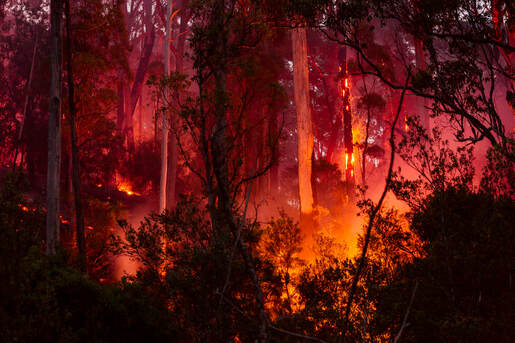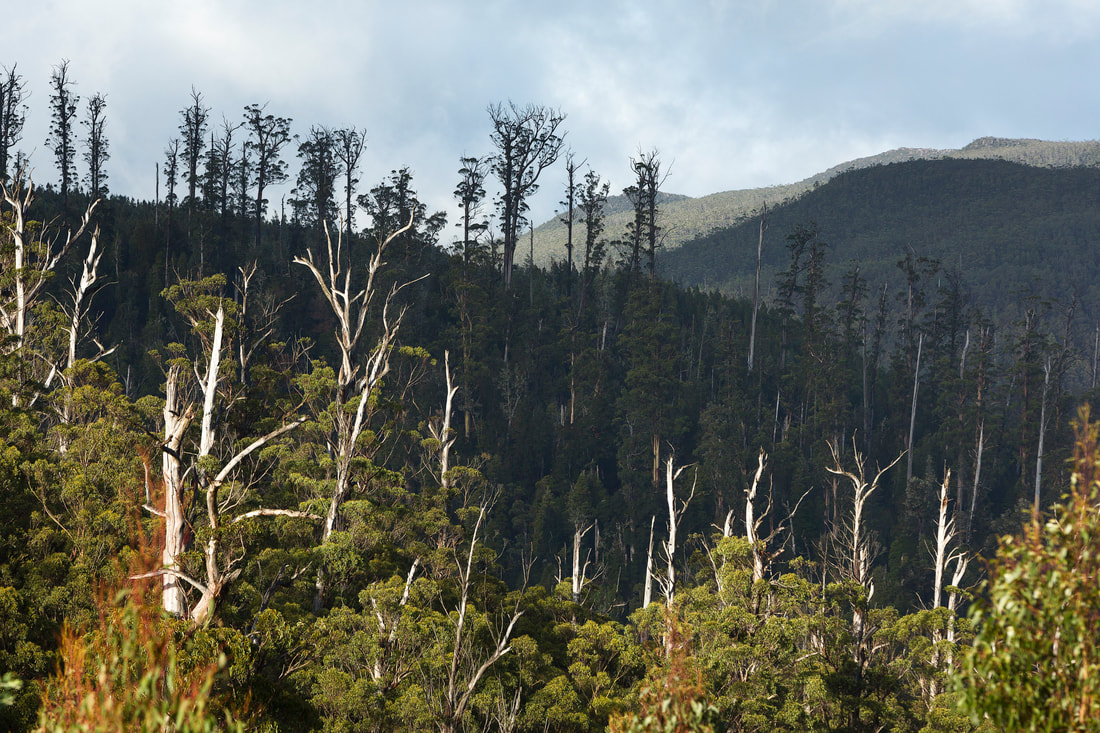Logging forests makes bushfire risk worse :
Protect forests and save us from fire.
by Dr. Jen Sanger
I AM among a group of scientists who presented an open letter to federal parliament calling for an immediate, nationwide end to all native forest logging. We wrote this letter because we are deeply concerned about the impacts that logging has on climate change and fire.
Australia is still reeling from the worst bushfires the world has ever seen. The scary reality is that conditions like this are going to become the norm under climate change.
We therefore need to be taking every possible step that we can to protect our communities from fire, which means putting an end to all native forest logging.
Our research has shown that fires are more intense in recently logged forests.
My colleagues and I studied last year’s fires in the Huon Valley region and found that the fires burned more intensely in recently logged forests and plantations. This pattern has also been found in forests in Victoria after the Black Saturday fires and in other forests around the world.
We therefore need to be taking every possible step that we can to protect our communities from fire, which means putting an end to all native forest logging.
Our research has shown that fires are more intense in recently logged forests.
My colleagues and I studied last year’s fires in the Huon Valley region and found that the fires burned more intensely in recently logged forests and plantations. This pattern has also been found in forests in Victoria after the Black Saturday fires and in other forests around the world.
We need to be taking fire very seriously and we need to plan accordingly. Logging areas often form the interface between our communities and larger tracts of forests. It is therefore extremely important that we consider the impact that logging has on fire when we plan for how best to make our communities fire resilient.
There is absolutely no doubt that this year’s catastrophic fires have been brought about by climate change. Last year was the hottest and driest year on record, which has led to our forests being very dry and extremely flammable. One of the simplest ways we can address climate change is to protect our native forests. They store a considerable amount of carbon and continue to draw down carbon over time. Swamp Gum forests, which grow right here in Tasmania, are the most carbon dense forests in the world.
There is absolutely no doubt that this year’s catastrophic fires have been brought about by climate change. Last year was the hottest and driest year on record, which has led to our forests being very dry and extremely flammable. One of the simplest ways we can address climate change is to protect our native forests. They store a considerable amount of carbon and continue to draw down carbon over time. Swamp Gum forests, which grow right here in Tasmania, are the most carbon dense forests in the world.
In 2016, Tasmania was the first jurisdiction in Australia to achieve zero net emissions. The reason we were able to achieve this is that our forests absorb a massive 7500 kilo-tonnes of carbon every year, which was enough to offset our state’s entire emissions.
The best economic use for our native forests would be to leave the forests intact and push for inclusion into a carbon trading scheme. This way our forests could provide much-needed revenue for the government, which could be used to restructure the economy, help develop new industries and revitalise our regional communities.
The native forest logging industry in Tasmania is very heavily subsidised by our taxes. They have received more than $1 billion in state and federal grants over the past few decades. This is money that could be better spent on fire prevention, mitigation and planning. These subsidies could be used to create a significant amount of jobs in our regional communities in the area of fire fighting and forest management roles. Our forestry workers have the knowledge and skills to be able to easily transition into these fields.
Protecting our native forests is a very simple way that we can to protect our communities from fire.
It is also a very effective way of combating climate change, which is the root cause of the bushfire crisis.
The best economic use for our native forests would be to leave the forests intact and push for inclusion into a carbon trading scheme. This way our forests could provide much-needed revenue for the government, which could be used to restructure the economy, help develop new industries and revitalise our regional communities.
The native forest logging industry in Tasmania is very heavily subsidised by our taxes. They have received more than $1 billion in state and federal grants over the past few decades. This is money that could be better spent on fire prevention, mitigation and planning. These subsidies could be used to create a significant amount of jobs in our regional communities in the area of fire fighting and forest management roles. Our forestry workers have the knowledge and skills to be able to easily transition into these fields.
Protecting our native forests is a very simple way that we can to protect our communities from fire.
It is also a very effective way of combating climate change, which is the root cause of the bushfire crisis.
AN OPEN LETTER TO THE PARLIAMENT OF AUSTRALIASadness at the losses from the fires sears our souls.
Worse might lie in wait. We write to ask you to respond to the climate, fire, drought and biodiversity loss crises with an immediate nationwide cessation of all native forest logging. We need our forestry workers to be immediately redeployed to fire services support and national park management to help protect the forests and us from fire. Large, old-growth trees are important for carbon capture and storage and they keep on capturing carbon for their entire life. Logging increases fire hazard in the short term. Many native species rely on unlogged forests. Our timber needs can be met from existing plantations, with no need to log native forests. Native forest logging is heavily subsidised by our taxes, which can be better spent on fire mitigation. This is above politics — please show the leadership Australia desperately needs. |
Prof James Kirkpatrick,
Distinguished Professor Geography and Spatial Sciences, University of Tasmania Prof Tim Flannery, Melbourne Sustainable Society Institute, University of Melbourne Prof William Laurance, Director of the Centre for Tropical Environmental and Sustainability Science, James Cook University Dr Jen Sanger, The Tree Projects, Geography and Spatial Sciences, University of Tasmania Andrew A. Bluhm, Hardwood Silviculture Cooperative, Department of Forest Ecosystems and Society, Oregon State University Dr Margaret Lowman, University of Singapore, Director of TREE Foundation Professor Louise Ashton, Assistant Professor, School of Biological Sciences, University of Hong Kong Dr Dominick DellaSala, President and Chief Scientist, Geos Institute Prof John Church, Climate Change Research Centre, University of NSW Janette Bulkan, Assoc/Prof, Department of Forest Resources Management, Faculty of Forestry, University of British Columbia John Palmer, Honorary research associate, Department of Forest Resources Management, Faculty of Forestry, University of British Columbia Dr Tim Cadman, Research Fellow, Institute for Ethics, Governance and Law, Griffith University Dr Chloe Lucas, Post-doctoral Research Fellow, Geography and Spatial Sciences, UTAS Catherine Kirby, Research Manager, University of Waikato, New Zealand Dr Carolina Garcia Imhof, PhD Environmental Sciences, UTAS Dr Nick Fitzgerald, Ecologist, UTAS |


